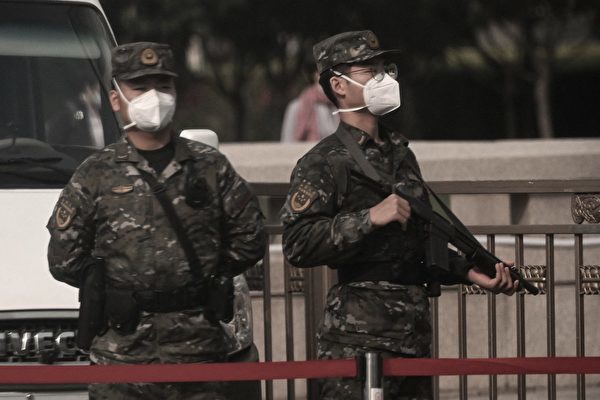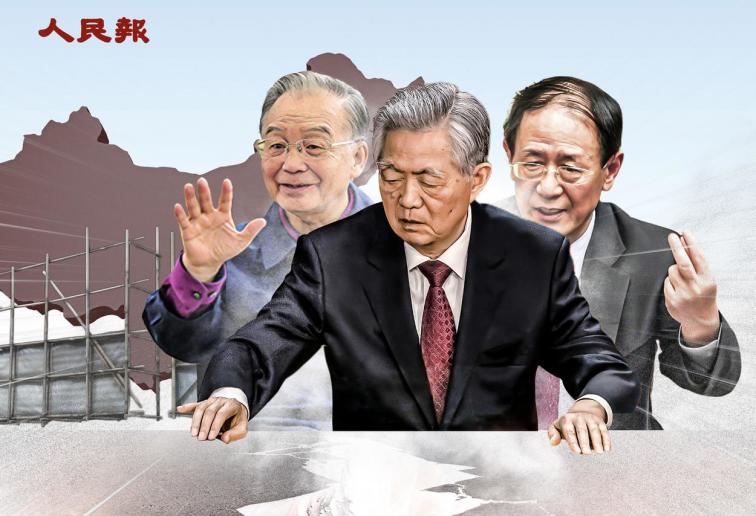Caption: On October 13, 2022, ahead of the 20th National Congress of the Chinese Communist Party, security personnel were stationed along the road leading to Tiananmen Square. (NOEL CELIS/AFP via Getty Images)
[People News] On June 28, the State Council Information Office of the Communist Party of China announced that a military parade will be held on September 3. The parade aims to showcase the military's strength to the outside world. In early July, a case involving a soldier named Zhou from Guilin, Guangxi, who faced severe penalties for refusing military service, was reported and circulated by mainland media. Du Wen, former deputy director of the Legal Advisory Office of the Inner Mongolia Legal Affairs Office, now in exile in Europe, stated that the phenomenon of refusing military service is far more serious than is commonly known. The harsh penalties imposed by the authorities on those who refuse military service reveal Xi Jinping's anxiety amid rising tensions in the Taiwan Strait and the fragility of human rights and freedoms under the CCP regime.
Recently, the local military department in Lingchuan County, Guilin, Guangxi, reported a typical case of refusal to serve. Zhou, born in 2004, is a graduate of a college program. After enlisting on March 1, 2025, he expressed his inability to adapt to military life and submitted three voluntary discharge applications, which led to his expulsion from the military for refusing service, along with severe penalties. These penalties include being barred from public office, prohibited from engaging in business, obtaining loans, or travelling abroad for two years, and a fine of 37,160 yuan.
Du Wen noted that official media annually report several cases of refusal to serve, serving as a warning to others through the principle of 'killing the chicken to scare the monkey.'
In April of this year, the government of Jishui County, Jiangxi Province, reported that Liu, who has a college degree, was expelled from the armed police after submitting five applications to leave the unit. Additionally, young individuals born after 2000, such as Yang from Tengzhou, Shandong, and Song from Suzhou, Jiangsu, faced severe joint penalties for their firm requests to retire after enlisting.
On October 22 last year, a recent college graduate from Jiangxi Province, identified as Zhang Moumou, was fined 6,000 yuan by the local government of Nanfeng County for 'refusing to fulfil military service obligations' and was subsequently placed on a list of untrustworthy individuals.
Wu Muluan, an associate professor at the Lee Kuan Yew School of Public Policy at the National University of Singapore, analyzed that this official public punishment highlights the pressures facing China's conscription system and the urgent need to retain talent. Military experts have noted that the penalties are excessively harsh, reflecting the current authorities' policy focus on military priorities.
Du Wen argues that the military service system of the Chinese Communist Party (CCP) is characterized by clear oppression and a one-sided approach. The authorities promote military service as a youthful vow and a glorious mission to defend the nation, showing a complete lack of respect for the actual circumstances of individual citizens' will. The law does not provide a legal means for refusing to participate in combat. Even in peacetime, any young person attempting to withdraw from military service midway will face extremely severe penalties.
Du Wen pointed out that this high-pressure approach reflects the CCP's consistent authoritarian mindset, willing to suppress any disobedient behavior through administrative, legal, and even social credit measures to uphold the authority of the system and ensure the absolute execution of orders.
In fact, cases of refusing military service have become increasingly common within the CCP's military.
Reports indicate that in 2019, Hebei Province documented 16 cases of individuals refusing military service. Du Wen disclosed that Inner Mongolia had over 200 such cases. Even earlier, in 2016, Shanxi Province reported 21 instances. Throughout the 2020s, similar incidents have been recurrent across various provinces and cities nationwide. Young people from Shandong, Henan, Anhui, Shaanxi, Hubei, Fujian, Gansu, Guangxi, and Jiangxi have all been recorded as facing disciplinary actions for refusing to serve in the military.
What drives these young individuals to risk severe penalties to leave military camps?
Du Wen analyzed that, firstly, there has been a long-standing issue of corruption and malpractice within the Chinese Communist Party's military, which makes it hard for many idealistic youths to relate to it. Serious issues such as deception within the ranks, the pursuit of positions through connections, and the prevalence of privileges among a select few are rampant.
Secondly, many contemporary children have grown up in privileged environments and are relatively pampered. When they enter the strictly disciplined and monotonous military life, many struggle to adapt both psychologically and physically.
Additionally, the inadequate treatment and placement of veterans have diminished the allure of military service. Many veterans encounter challenges in securing employment after discharge, receive low wages, and find it difficult to sustain their livelihoods, often facing suppression and retaliation when they seek to assert their rights. The military profession in China is not regarded as a respectable and secure career; instead, it can jeopardize one's future and freedom.
Du Wen also pointed out a deeper issue: the awakening of consciousness and shifts in values among the younger generation in China. Many are reluctant to serve as cannon fodder for an authoritarian regime and do not wish to continue sacrificing their lives for the Communist Party.
On February 15, 2017, the People's Liberation Army Daily published an article titled 'Those Who Refuse and Evade Military Service Should Be Punished,' which stated that some young people in China are 'trying every means to evade their military service obligations.' This includes actions like getting ear piercings, getting tattoos, pretending not to hear or see, and standing unsteadily. In coastal regions such as Shanghai, Zhejiang, Jiangsu, Hubei, and Fujian, there have been reports of young individuals refusing to complete their military service through methods like hunger strikes, a trend that has continued despite repeated attempts to curb it.
Du Wen argues that if young people in China are sent to the battlefield and forced to risk their lives for political reasons, evasion and resistance will likely become even more common. In the event of large-scale conscription, there could be significant pushback. Even before a war begins, there will be deserters. As the country edges closer to conflict, the Chinese Communist Party (CCP) grows increasingly concerned about potential deserters and resorts to extreme measures for preemptive deterrence.
Du Wen also noted that the current crisis in the Taiwan Strait is intensifying. If war breaks out, soldiers may be compelled to fight, which would inevitably reduce their combat effectiveness. If they harbour doubts about their mission or dissatisfaction with their leaders, their first instinct on the battlefield may not be to charge but to seek an escape route. A military lacking in morale and a war without a just cause is bound to fail.
Du Wen also called on parents and young people of appropriate age in mainland China not to allow their children to die for a dictator. He emphasized that if war were to break out, it would simply be a disaster instigated by the elites in Zhongnanhai to fulfil their personal desires, completely disconnected from the happiness and well-being of ordinary citizens. Life is only lived once, and once it is lost, it cannot be reclaimed. As more individuals awaken, the dictator's weapons will ultimately become ineffective. When no one is willing to risk their lives for the dictator any longer, the basis for that premeditated war will also vanish.
Du Wen further predicted that once conflict erupts in the Taiwan Strait, officials at all levels will take to the streets to forcibly conscript young people, and those who resist will face execution; such occurrences are likely imminent.
Du Wen advised that if possible, parents should secure passports for their children, and should the situation turn dire, send them abroad in advance. He hopes that every parent will carefully consider their children's futures and never allow them to die for a dictator. Let our next generation be spared from bearing the sins of invading others and not become sacrificial victims of totalitarianism.
The South China Morning Post reported that in recent years, China has intensified military education for teenagers, with some universities including drone and rocket launch training in their combat training programs, and even kindergartens being organized to visit military camps, as the military aims to 'plant the seeds of a strong military.' Additionally, the Chinese Communist Party is seeking to enhance national defence education through legislative reforms. Shen Chunyu, director of the Legislative Affairs Commission of the Standing Committee of the National People's Congress, stated last year that they are exploring ways to strengthen practical skills training for young people to adapt to the 'complex and changing security and development environment.'
(This article was first published by the People News)










News magazine bootstrap themes!
I like this themes, fast loading and look profesional
Thank you Carlos!
You're welcome!
Please support me with give positive rating!
Yes Sure!